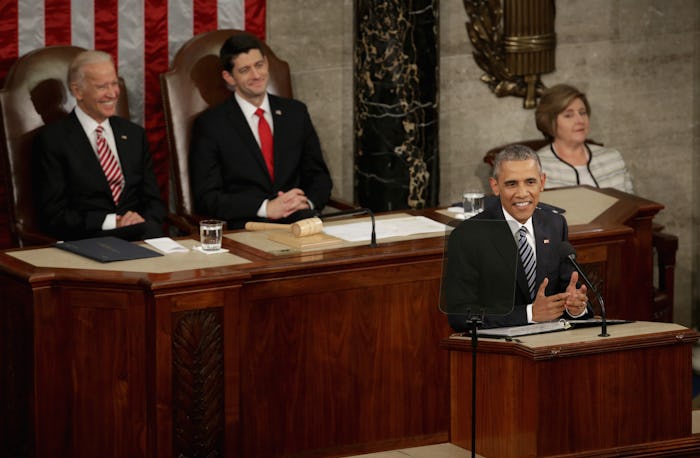
Historical References In Obama's State Of The Union Speech Helped Remind Everyone Just How Capable Americans Are Of Doing Great Things
On Tuesday, Jan. 12th, President Obama gave his final State of the Union address to members of Congress and Americans across the country. As promised, Obama kept his final SOTU short and sweet, touching on themes such as the future, change, overcoming fear, social progress, technology, national safety, and job security, among other things. There were also many historical references in Obama's SOTU speech, perhaps because while the president was committed to remaining hopeful, he was also somewhat nostalgic and, perhaps, a little sad that this SOTU address would be his last.
In an effort to highlight the creativity and entrepreneurial spirit of the American people, the president highlighted historical figures that embody the spirit of discovery, research, development and innovation. He touched on the race to the moon and the wonder in which the United States used to look up at the sky and reach for space. Obama spoke about the immigrants who came to the United States and created innovative cities like Boston, Austin, and even Silicon Valley.
The president also brought up past wars, like Vietnam and the war in Iraq, to highlight the need to fight current terror threats in a smarter, more disciplined way.
And that was just the tip of the State of the Union iceberg. While it was clear that the president was hopeful, optimistic and believed in the future of the country he had been serving for close to eight years, he was quick to look at the past and remind the American people of how far we have come, and how capable we are of doing amazing things.
Here's a breakdown of all those amazing people he mentioned:
Thomas Edison
Thomas Alva Edison was an American inventor and businessman. He developed innovative and world-changing devices, like the phonograph, the motion picture camera, and the long-lasting, practical electric light bulb.
The Wright Brothers
The Wrigght Brothers were inventors and aviation pioneers, who invented and built the world's first successful airplane.
George Washington Carver
George Washington Carver was an American botanist and inventor, who was born into slavery.
Grace Hopper
Grace Hopper was an American computer scientist and United States Navy Rear Admiral from New York, New York. She is credited with saying, "It is often easier to ask for forgiveness than to ask for permission".
Katherine Johnson
Katherine G. Johnson is an American physicist and mathematician, who contributed to America's aeronautics and space programs with the early application of digital electronic computers at NASA.
Sally Ride
Sally Ride became the first American woman in space in 1983.
Images: Alex Wong/Getty Images; Giphy (6)